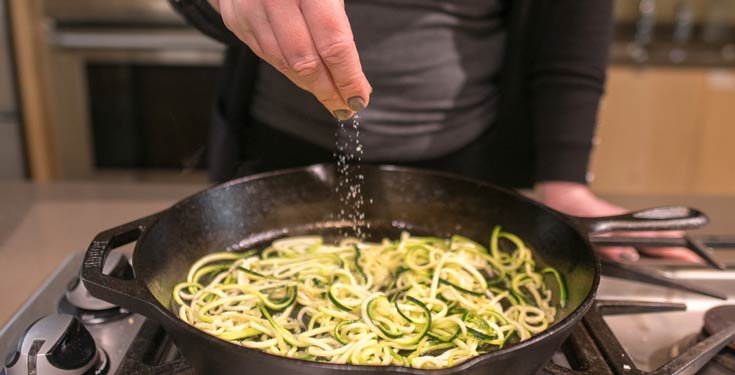NUNM’s SIBO Center offers analysis and results for the SIBO Breath Test to physicians and patients throughout the United States. In addition, NUNM’s team of naturopathic doctors, acupuncturists and student interns are available to serve patients and their individual SIBO needs with a holistic approach.
SIBO Center’s nutritionist, Kristy Regan, MScN ‘(15), discusses nutrition as it relates to SIBO. Want to learn more about SIBO? Sign up for SIBO Center’s newsletter and visit the SIBO Center website for more information.
Many people adopt a SIBO diet on the advice of their healthcare provider. For some, a change in diet may be enough to reduce or eliminate their bacterial overgrowth. However, the majority of people will need to go through one or more rounds of an herbal or pharmaceutical protocol to remove the overgrowth. Diets are often part of the picture and are primarily used to mitigate symptoms.

Since a major change in diet and long term restriction can cause stress, anxiety and unwanted weight loss in some people, it’s important to understand the needs of the patient in relation to the diet. No one should be given a “one size fits all” diet before a specific conversation. The questions below are a great place to start when discussing the SIBO diet. If this area seems overwhelming, it may be time to seek the support of a SIBO literate nutritionist.
- Current symptom levels? The diet is meant to mitigate symptoms so it makes sense that this will be one of your first and most important questions. If the patient is having issues going about their daily tasks because of symptoms, they may greatly benefit from a short term, more restricted diet such as Dr. Siebecker’s SIBO Specific Food Guide or Dr. Jacobi’s Bi-Phasic diet. As the patient begins to heal, it’s important to consider whether they can move to a less restrictive diet, such as low FODMAP.
- History of disordered eating? For those with disordered eating habits or behaviors, many SIBO diets can cause undue stress and anxiety. Keeping a food diary or having to follow a very restrictive diet may trigger old patterns of behavior or overwhelming feelings. In this case, it may be helpful to restrict a few foods that tend to bring on symptoms and focus on incorporating easily digestible foods, such as soups and purees.
- SIBO test result numbers? If a person has relatively low numbers, they may be able to take one round of antibiotics and eliminate their overgrowth. Many doctors prefer that patients not be on a SIBO diet while they’re on antibiotics, in order to “feed” the bacteria. If the doctor plans to give an antibiotic protocol right away then it doesn’t make sense for the patient to start a diet. The next question would be whether they would benefit from being on a SIBO diet while they are in a post-SIBO healing phase. This would likely depend on their symptoms and overall health. If a person has relatively high numbers, as well as being symptomatic, they may benefit from starting a SIBO diet right away.
- Anxiety level? Most people who adopt a SIBO diet experience some level of stress from restricting foods, spending more time on cooking, and researching different diets. For those with already high anxiety levels, adopting a restrictive diet can increase anxiety, which may in turn have a negative impact on their overall digestion and well-being. Conversely, adopting a diet may mitigate symptoms which will result in less anxiety overall. Clearly, it’s really important to see how the patient feels about adopting a diet and if it will create undue anxiety.
- Underlying Cause? Some individuals have an underlying cause that will cause their SIBO to recur or be present continually, such as those with anatomical abnormalities. For these patients, it may be helpful to create a longer term diet that is tailored to the individual. All the SIBO diets are meant to be a starting point and each person needs to eat foods to test them and determine what they tolerate. For those with an ongoing overgrowth, it may be extremely beneficial to start tailoring a diet right away to support healing.
- Cooking interest/level of expertise? For someone who doesn’t cook, or cooks for a large family and doesn’t have much time, adopting a SIBO diet can be especially tricky. Many people restrict more than they need to and eat a smaller subset of food that is easy to prepare. This may cause unwanted weight loss or they may start to react to the few foods that they are consuming. It may be helpful in this case to refer them to local professionals for SIBO specific cooking lessons or the support of a personal chef. No matter what, it is important for SIBO patients to keep as much variety in their diet as possible.